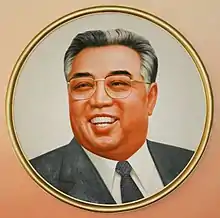| "Song of General Kim Il Sung" | |
|---|---|
 Sheet music cover | |
| Song | |
| Written | 1946 |
| Genre | March |
| Composer(s) | Kim Won-gyun |
| Lyricist(s) | Ri Chan |
| Audio sample | |
| |
The "Song of General Kim Il Sung" (Korean: 김일성장군의 노래 Kimilsung janggunui nolae) is a North Korean marching song composed by Kim Won-gyun in 1946. As a part of an ongoing cult of personality, the song praising Kim Il Sung, North Korea's "Eternal President", who died in 1994, is still widely played in the country. It is often considered to be the de facto national anthem in North Korea.

The song is a four-square march. It features paired two bar phrases in an A-B-A form,[1] with dotted rhythms. Percussion and brass instrumentation is intended to enhance the revolutionary tone of the song.[2]
The song, composed in 1946, is the earliest known work of art mentioning Kim Il Sung, and thus can be said to mark the beginning of his personality cult.[3]
In the early 1980s Kim Jong Il began promoting the song and it has since replaced "Aegukka", the national anthem, as the most important song and the de facto anthem played in public gatherings in the country. North Koreans typically know the lyrics by heart,[4] though this seems to have changed under his grandson, Kim Jong Un.
The first two bars of the song are used as an interval signal on North Korean radio and television. According to North Korean sources, their satellites Kwangmyŏngsŏng-1, launched in 1998,[5] and Kwangmyŏngsŏng-2, supposedly launched in a test on 5 April 2009, are broadcasting this song among other data.[6]
Emulating a Buddhist tradition of carving sutras, its lyrics are carved in stones[2] as well as the Pyongyang Arch of Triumph.[7]
The song is played by the North Korean state television and Voice of Korea at the start of broadcasts each day.[8]
| Song of General Kim Il Sung | |
| Chosŏn'gŭl | 김일성장군의 노래 |
|---|---|
| Hancha | 金日成將軍의 노래 |
| Revised Romanization | Gim Ilseong Janggun ui Norae |
| McCune–Reischauer | Kim Ilsŏng Changgun ŭi Norae |
See also
- "Song of General Kim Jong Il"
- "Aegukga" – National anthem of South Korea
- "Aegukka" – National anthem of North Korea
References
- ↑ Collège de France; Ok Yi; Daniel Bouchez; Yun-ik Chang (2000). Cahiers d'études coréennes. Centre dʹEtudes Coréennes du Collège de France. p. 112.
- 1 2 Jane Portal (2005). Art Under Control in North Korea. Reaktion Books. p. 93. ISBN 978-1-86189-236-2.
- ↑ Jae-Cheon Lim (24 March 2015). Leader Symbols and Personality Cult in North Korea: The Leader State. Routledge. p. 29. ISBN 978-1-317-56741-7. Retrieved 25 April 2015.
- ↑ Eddie Burdick (2010). Three Days in the Hermit Kingdom: An American Visits North Korea. McFarland. p. 248. ISBN 978-0-7864-5653-6.
- ↑ Brian Harvey; Henk H. F. Smid; Theo Pirard (2011). Emerging Space Powers: The New Space Programs of Asia, the Middle East and South-America. Springer Science & Business Media. p. 443. ISBN 978-1-4419-0874-2.
- ↑ "Defiant N Korea launches rocket". BBC News. 5 April 2009.
- ↑ Justin Corfield (2014). Historical Dictionary of Pyongyang. Anthem Press. p. 9. ISBN 978-1-78308-341-1.
- ↑ "KCTV startup". YouTube. Retrieved 28 May 2017.
External links
- Song of General Kim Il Sung on YouTube
- "The Song of General Kim Il-sung" (mp3) at Naenara
- Lyrics in Korean and English
- Score with English lyrics at Naenara
- Orchestral choir performance